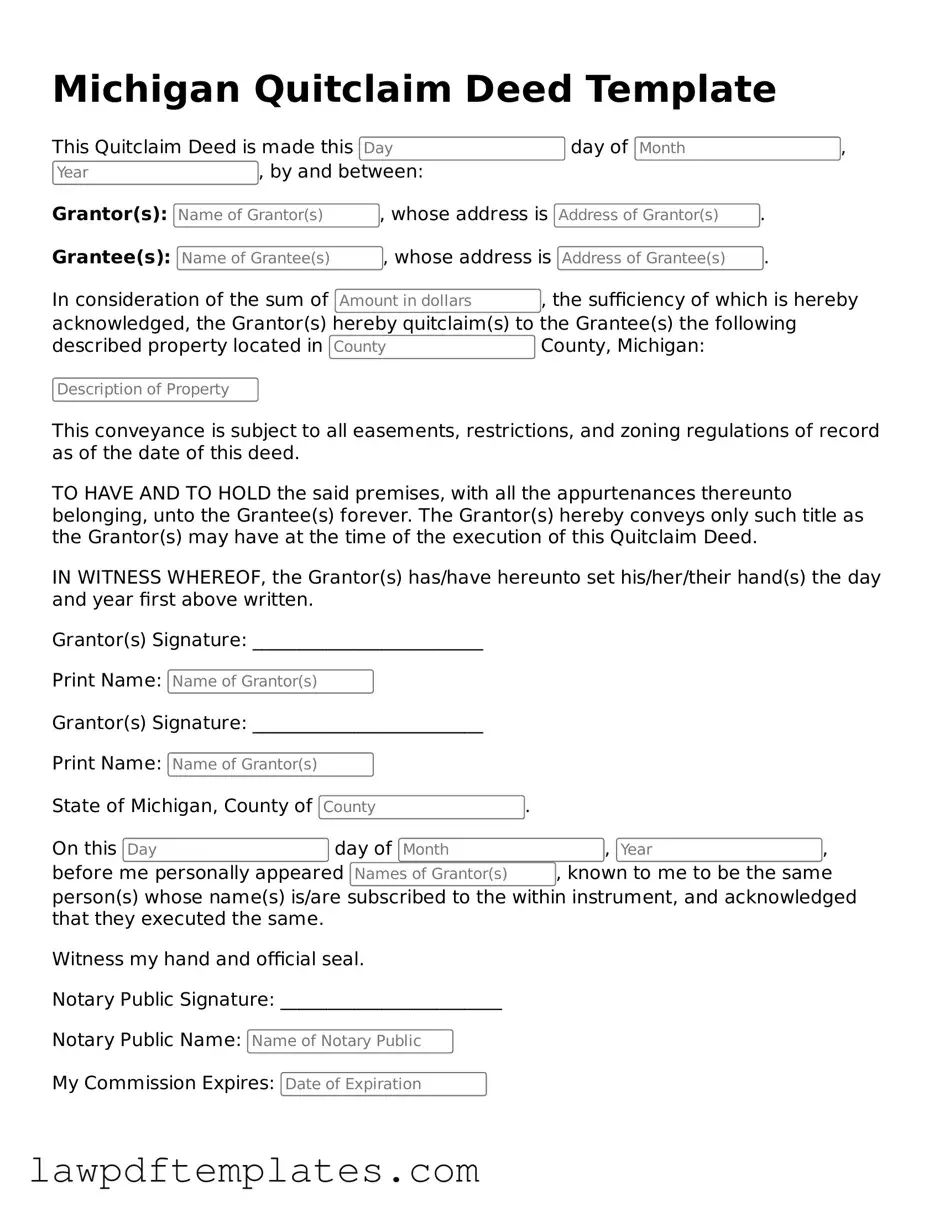Free Quitclaim Deed Template for the State of Michigan
Form Breakdown
| Fact Name | Description |
|---|---|
| Definition | A quitclaim deed is a legal document that transfers ownership of property from one party to another without any warranties. |
| Governing Law | The Michigan Quitclaim Deed is governed by Michigan Compiled Laws, Act 91 of 1963. |
| Parties Involved | The form involves two parties: the grantor (seller) and the grantee (buyer). |
| No Guarantees | The grantor does not guarantee that they own the property or that it is free of claims. |
| Usage | Commonly used among family members or in situations where the parties know each other well. |
| Recording | The quitclaim deed should be recorded with the county clerk to provide public notice of the property transfer. |
| Consideration | Consideration, or payment, is not required but is often included to validate the transaction. |
| Signature Requirement | The grantor must sign the deed in the presence of a notary public for it to be valid. |
Sample - Michigan Quitclaim Deed Form
Michigan Quitclaim Deed Template
This Quitclaim Deed is made this day of , , by and between:
Grantor(s): , whose address is .
Grantee(s): , whose address is .
In consideration of the sum of , the sufficiency of which is hereby acknowledged, the Grantor(s) hereby quitclaim(s) to the Grantee(s) the following described property located in County, Michigan:
This conveyance is subject to all easements, restrictions, and zoning regulations of record as of the date of this deed.
TO HAVE AND TO HOLD the said premises, with all the appurtenances thereunto belonging, unto the Grantee(s) forever. The Grantor(s) hereby conveys only such title as the Grantor(s) may have at the time of the execution of this Quitclaim Deed.
IN WITNESS WHEREOF, the Grantor(s) has/have hereunto set his/her/their hand(s) the day and year first above written.
Grantor(s) Signature: _________________________
Print Name:
Grantor(s) Signature: _________________________
Print Name:
State of Michigan, County of .
On this day of , , before me personally appeared , known to me to be the same person(s) whose name(s) is/are subscribed to the within instrument, and acknowledged that they executed the same.
Witness my hand and official seal.
Notary Public Signature: ________________________
Notary Public Name:
My Commission Expires:
Common mistakes
When filling out the Michigan Quitclaim Deed form, many individuals overlook critical details that can lead to complications down the line. One common mistake is failing to provide accurate property descriptions. A precise legal description is essential for identifying the property being transferred. Without it, future disputes may arise regarding the boundaries and ownership of the property. Always double-check the description against official records to ensure accuracy.
Another frequent error is neglecting to include the necessary signatures. Both the grantor (the person transferring the property) and the grantee (the person receiving the property) must sign the deed. Additionally, the signature of a notary public is required to validate the document. Omitting any of these signatures can render the deed invalid, causing delays and potential legal issues.
People often misinterpret the implications of the Quitclaim Deed itself. Unlike other types of deeds, a Quitclaim Deed does not guarantee that the grantor holds clear title to the property. This means that if there are existing liens or claims against the property, the grantee may assume those risks. It’s crucial to conduct thorough due diligence before proceeding with the transfer to avoid unexpected liabilities.
Lastly, individuals sometimes forget to record the Quitclaim Deed with the local county register of deeds. Failing to file the deed means that the transfer may not be recognized publicly, which can lead to confusion about ownership in the future. Recording the deed is a vital step in protecting the rights of the new property owner and ensuring that the transaction is documented properly.
Discover More Quitclaim Deed Templates for Specific States
Quitclaim Deed Form Ohio - This deed is often used in business partnerships to handle real estate assets.
Where Can I Get a Quitclaim Deed Form - A Quitclaim Deed is a practical tool when resolving property disputes in mediation.
Additionally, for those looking for professional templates to streamline their shipping processes, the Fast PDF Templates provide an excellent resource for creating effective and compliant FedEx Bill of Lading forms.
Arizona Quit Claim Deed Example - A Quitclaim Deed is a legal document that transfers ownership of property from one party to another.
What Does a Deed Look Like in Nj - It is important to assess the implications of using a Quitclaim Deed in any real estate transaction.
